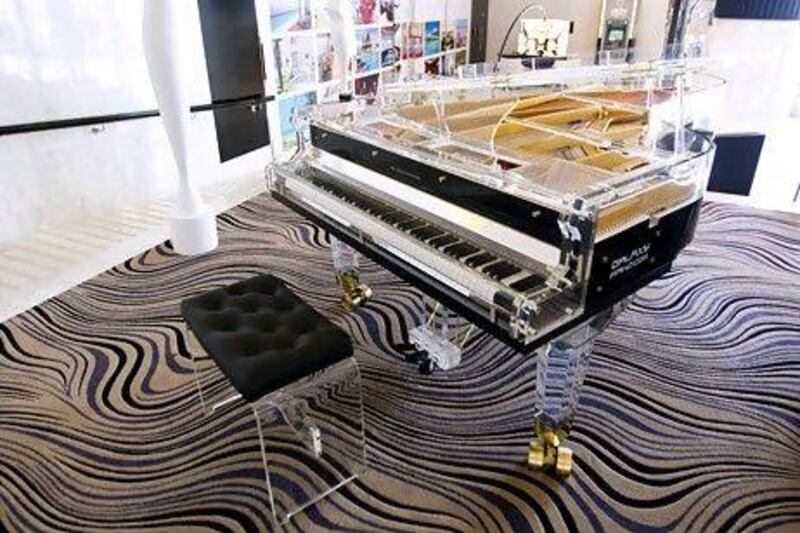Walk into the lobby of the new Sofitel hotel and it exudes opulence.
A rich scent of perfume wafts through the air, there is a grand piano, its workings encased in a transparent body, and the staff are elegantly dressed.
Wander upstairs and there is modern, upmarket jazz bar and a stylish seafood restaurant. It may sound like you are in the heart of a western city but, in fact, this stylish new property is located on Abu Dhabi's Corniche.
The Sofitel Abu Dhabi is the latest luxury hotel to open its doors in the capital and it is part of something of a renaissance on the Corniche.
"The Corniche, I think, is still the heart of the city," says Oliver Key, the general manager of the St Regis Abu Dhabi, another luxury hotel being developed at the other end of the road as part of the Dh1.6 billion (US$435.5m) Nation Towers project. "It's a great stretch of coastline."
The hotel is expected to open in September and is part of a complex that will include apartments, offices and shops.
But these hotels will need to work hard to generate business. Despite several new developments coming on to the market, total hotel revenues in Abu Dhabi increased only by 1 per cent to Dh1.2bn in the first quarter compared with the same period last year, figures from the Abu Dhabi Tourism and Culture Authority show.
The extra hotel supply triggered a 6 per cent decline in occupancy to 64.1 per cent in the first quarter compared with the same months last year, according to STR Global. Abu Dhabi's average daily room rate, meanwhile, fell 11.7 per cent to Dh633.85.
Mr Key believes his hotel's unique attractions will draw guests in.
These include a Gary Rhodes restaurant, a beach club, butler service and a 1,100-square metre suite located in what the hotel describers as the world's tallest bridge between two buildings.
"That will be a talking point for sure," says Mr Key. "The two towers are joined at the top with a bridge. The entire bridge is just the majlis living space of the suite. It has a little spa area, it has a little cinema."
Just like the St Regis, Jean-Philippe Bittencourt, the general manager of the Sofitel, which opened in March, knows he will have his work cut out to entice guests. More than 2,000 luxury hotel rooms have already opened in Abu Dhabi in just a matter of months.
"The St Regis will be our direct competitor because it's in the Corniche," says Mr Bittencourt.
"The market is very challenging because there are so many hotels. Our prime market is corporate because of the location and also because of the facilities we have in our hotel. And of course we're also trying to attract people especially coming for short breaks, weekends."
Rotana, which operates properties including the Khalidiya Palace, which opened in 2010 and is located opposite Emirates Palace, is noticing the effect of the competition, which includes the nearby Jumeirah Etihad Towers property, launched in November.
"Abu Dhabi is definitely feeling the heat from the additional inventory," says Selim El Zyr, the president and chief executive of Rotana Hotels. "New hotels are finding their way. It usually takes one year, two years to stabilise in a market where demand is lower than supply. There's also pressure on existing hotels, which are losing market share and occupancy."
Yet the capital still has work to do on establishing itself as a destination and on how it can bring in more tourists during the summer.
"The challenges of the 'low-season' need to be tackled," says Chiheb ben Mahmoud, the head of hotel advisory at Jones Lang LaSalle Hotels, Middle East and Africa. "It is important that all parties and stakeholders to cooperate in order to implement the destination growth strategy."
The Ritz-Carlton Grand Canal, meanwhile, is expected to open in the Between The Bridges area, later this year. It has 532 rooms and is hoping to bring something new to the capital, too.
"The project will have a hotel but also we have a 'Venetian village' that will be on the side of the hotel, where the customers will be able to walk through and it will feel a bit like being in a small Italian town and that will also be offering some food and beverage options," says Pascal Duchauffour, the area vice president for Ritz-Carlton in Europe, the Middle East and Africa.
"Abu Dhabi has to develop more leisure. Abu Dhabi will get there but I think the next few years are going to be a bit challenging because you have a large supply. But in the long term I think Dubai and Abu Dhabi will complement each other."
Neil George, the vice president of acquisitions and development in Africa and the Middle East for Starwood, which has brands including St Regis, Sheraton and Le Meridien, is also confident in the future.
"If you take a long-term view - we're in the long-term business -our hotel contracts are for 30, 35, 40 years, so a couple of years doesn't change your view about the market as a whole. Over time, the fundamentals are still there."
twitter: Follow and share our breaking business news. Follow us
iPad users can follow our twitterfeed via Flipboard - just search for Ind_Insights on the app.





